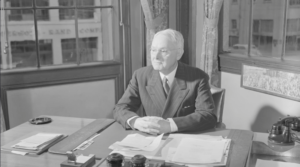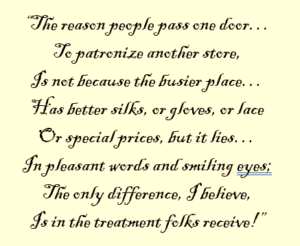In 1908, Edward and William Manning launched Manning’s, a successful coffee and restaurant business that operated for 76 years. At its peak, the company employed over 800 people and operated over 65 coffee stories, cafeterias, and bakeries on the West Coast. In addition, Manning’s coffee was sold in grocery stores alongside major brands like Folger’s and Maxwell House, and the company earned millions of dollars in profits per year.

Edward Manning at his desk in San Francisco (photo circa 1930s).
Manning’s business operations provide an excellent case study for how to use best practices in business management, robust marketing tools, and positive labor relations to promote business success. But while Manning’s did everything right—as per sustainable business practices—to build a successful enterprise, this wasn’t the secret to Manning’s success. The secret? Good ethics.
Ethical Organizational Cultures Happen by Design
According to Epley and Kumar, writing in the “Harvard Business Review,” ethical organizations must be designed and include the following critical features.
- Ethical values that are made explicit through tools such as mission statements.
- Development of thought processes that focus on being ethical, not because actions are required by law, but because it’s the right thing to do.
- Incentives, such as praise and the opportunity to help others, to reward ethical behavior.
- An ethical “tone at the top” and social norms that promote an expectation of ethical behavior.
Manning’s Offers a Stellar Example of an Organization with an Ethical Culture
How did Manning’s make ethics a priority? It began with ethical leadership and emphasizing ethics throughout the company’s operations. This included tools, such as an employee handbook that provided guidance on how Manning’s employees should behave. The handbook included a limerick about how to treat customers that ended with these lines:

At Manning’s, it was not enough to get the job done. The job had to be done with merit. As one of Manning’s employees stated in a 1959 interview with “Volume Feeding Management” magazine, “I believe that the formula for the success of Manning’s can be contained in the simple word ‘integrity’—moral soundness, honesty, and uprightness. All of these attributes are the essence of our company’s attitude toward vendors, employees, and public.”
At Manning’s, Doing the Right Thing was a Priority
This was demonstrated throughout the company’s history as Manning’s did what was right, even when it wasn’t required by law. For example, Walter Clark, the manager of one of Manning’s Portland restaurants, left in 1917 to go overseas and fight in World War I for two years. When he came home in 1919, his job at Manning’s was waiting for him, along with a raise from $14 to $18, a highly competitive wage at that time. This might not sound like a big deal…except…Congress did not pass the Veterans’ Preference Act—ensuring that veterans can return to their jobs after completing a tour of duty—until 1944, 25 years after Mr. Clark returned from war.
Then, consider Gertrude Frederick, a personnel manager for a Manning’s cafeteria in Portland who became pregnant in the early 1960s. Manning’s gave Mrs. Frederick several weeks off for maternity leave and held her job open while she was gone. Again, this might not sound like a big deal…except…Congress did not pass the Pregnancy Discrimination Act—which prohibits discrimination against pregnant employees and requires employers to hold positions for women while they are off work for maternity leave—until 1978.
Being Ethical Promoted Manning’s Success
Why would a business take such actions, even when not legally required to do so? Throughout the company’s history, Manning’s managers practiced ethical leadership to ensure that employees experienced a positive work environment that fostered an ethical organizational culture.
While this was the right thing to do, it also became a key component of Manning’s business success. The positive, ethical organizational culture that Manning’s cultivated among employees spilled over to the dining rooms and service counters at Manning’s locations, giving customers an inviting and relaxing place to grab a cup of coffee, eat a meal, read the newspaper, and/or share a laugh with friends. As customers came to regard Manning’s coffee stores and cafeterias as third places, a welcoming spot to hang out away from home, Manning’s success grew. Many customers stopped by Manning’s several times per month, or even weekly, to relax and take a break from the hustle and bustle of their lives.
Manning’s managers expanded on ethical leadership to practice corporate social responsibility (CSR), enabling the optimistic environment inside Manning’s facilities to spill out the doors and into the communities where Manning’s coffee stores and restaurants were located.
For example, as early as 1912, the Seattle newspaper reported that Manning’s supported a program to give holiday gifts to “little chimney kids,” poor children who would otherwise miss out on holiday gifts. During the 1930s, Manning’s was involved in the California Chain Stores Association, helping promote a community partnership between chain stores and their customers by ensuring that employees received fair wages and customers received fair prices.
Manning’s managers practiced CSR long before CSR was promoted as a good business practice. During Manning’s early years, CSR was actually discouraged by business leaders who argued that businesses should focus on making a profit. As such, charity and virtuous deeds had no place in business operations. But at Manning’s, CSR was an important part of operations when it was not expected, just because it was the right thing to do.
We offer Manning’s story as an excellent case study for other businesses that seek to incorporate ethical leadership and CSR into a successful business model. And, just how successful was Manning’s? The last of Manning’s restaurants closed its doors in 1984, and Manning’s coffee was removed from store shelves several decades ago. But, over 30 years later, former employees and customers remembered Manning’s fondly.
For example, in 2015, The San Francisco Chronicle’s food critic, Peter Hartlaub, listed Manning’s as one of the “five restaurants we wish were still around…This popular diner from the middle of the 20th century had fabulous signage and offered a classic breakfast diner scene that is now lacking in San Francisco.”
Want to learn more? Our blog, “Women Were a Key to Manning’s Success,” explores the role of women in Manning’s success, since the company relied heavily on female employees, and our blog, “Manning’s: A Case Study of Best Practices in Business Management,” explores how Manning’s business practices promoted business sustainability. For even more details, please check out our book, “Manning’s: A Formula for Success.”
Copyright ©2023 Locke & Kant, LLC


